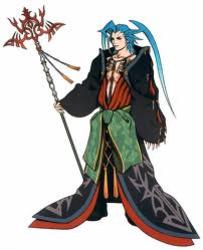I was playing Harvest Moon, and this appeared to me: The kanji after 大 is outdated, I… - Feed Post by TheTower
I was playing Harvest Moon, and this appeared to me:
The kanji after 大 is outdated, I think. But I didn't understand very well the phrases. May someone help me? I used jisho, google translate, k.r.h. convert, wakan, everything, but I couldn't translate! D:

The kanji after 大 is outdated, I think. But I didn't understand very well the phrases. May someone help me? I used jisho, google translate, k.r.h. convert, wakan, everything, but I couldn't translate! D:

posted by TheTower August 27, 2014 at 11:14am
Comments 7
- All I know is 変 is not outdated, by itself it means strange (hen). I don't know about 大変 (taihen) but here someone asked about it: https://answers.yahoo.com/question/index?qid=20100413212849AALp3S3
Btw, what version of HM is it?August 27, 2014 at 11:51am  おう!ちょっどよかった。
おう!ちょっどよかった。
ちょっと来てくれ! 大変なんだ!!August 27, 2014 at 11:52am ちょうど, my bad.August 27, 2014 at 11:54am
ちょうど, my bad.August 27, 2014 at 11:54am It translates to somethig like "just in time! get over here, we have trouble!"August 27, 2014 at 11:58am
It translates to somethig like "just in time! get over here, we have trouble!"August 27, 2014 at 11:58am 変 is a very common kanji. 大変【たいへん】is a common na-adjective meaning things like 'great, serious, terrible, dreadful'.
変 is a very common kanji. 大変【たいへん】is a common na-adjective meaning things like 'great, serious, terrible, dreadful'.
ackdel's translation seems to perfectly capture the meaning into regular English speech. I'm pretty bored though, so I'll break down the full text, even if it's of no interest to anyone...
おう is the same as おお (meaning 'Oh!' or 'Ah!')
ちょうど is an adverb meaning 'just, right, exactly'.
よかった is the past conjugation of the i-adjective 良い【いい/よい】(meaning 'good, sufficient, OK') so would mean 'was good'. HOWEVER, よかった is regularly used to mean 'glad [that something has happened]' often as an interjection.
ちょうどいい means 'just right' (ちょうど + 良い), so the past form of this is ちょうどよかった 'was just right' or 'was exactly right'. HOWEVER, it's probably the 'glad' meaning of よかった that is meant here...
So, ちょうどよかった here means more like 'glad [that something] just [happened]'.
The second line:
ちょっと is an extremely well known adverb.
来て【きて】 is the '-te form' of the verb 来る【くる】(meaning 'come').
くれ is the imperative form of the auxiliary verb くれる (meaning 'do [for me]'). This makes the verb that it's attached to into a command for the listener to do (for the benefit of the person giving the command).
So, ちょっと来てくれ!means 'come [over here] (for me) just a minute'.
なんだ is a common grammatical feature appearing at the end of sentences (though the な is only needed after nouns). It basically makes this an explanatory sentence (in this case explaining why the listener is being asked to 'come here').
Check out a proper explanation of んだ(のだ)/んです(のです) here:
http://www.guidetojapanese.org/particles3.html#part5August 27, 2014 at 1:58pm ^ mog86uk you're perfect. God a bunch of good notes from that.August 27, 2014 at 7:21pm
^ mog86uk you're perfect. God a bunch of good notes from that.August 27, 2014 at 7:21pm Guys, you are fantastic! =DD
Guys, you are fantastic! =DD
I thought the kanji was outdated because the only kanji that I found was 芟 :s
Akuma, it's Harvest Moon - Boy & Girl.
Ackdel and Mog, thank you very very much, perfect explanation!!
\(^-^)/
August 28, 2014 at 1:56am

